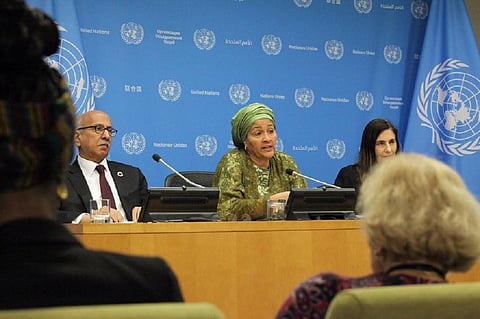

Trillions of dollars are needed if the 17 Sustainable Development Goals (SDGs), agreed upon by all United Nations members back in 2015, are to be achieved by 2030, a new report by the world body has said.
That is because financial challenges are at the heart of the world’s sustainable development crisis. Staggering debt burdens and sky-high borrowing costs prevent developing countries from responding to the confluence of crises they face, a UN statement released on April 10, 2024, noted.
Meanwhile, rising geopolitical tensions, climate disasters and a global cost-of-living crisis have hit billions of people, battering progress on healthcare, education, and other development targets, it added.
Only a “massive surge of financing” and a “reform of the international financial architecture” can rescue the SDGs now, according to the statement.
Some $4.2 trillion are needed in investments to close the development financing gap. This number was $2.5 trillion before the COVID-19 pandemic began, according to the 2024 Financing for Sustainable Development Report: Financing for Development at a Crossroads (FSDR 2024). The report was launched on April 9.
According to the report, debt service will be $40 billion annually between 2023 and 2025 in the least developed countries (LDC). This will be more than 50 per cent from $26 billion in 2022.
Stronger and more frequent disasters, caused to the ongoing climate crisis, account for more than half of the debt upsurge in vulnerable countries.
“The poorest countries now spend 12 per cent of their revenues on interest payments — four times more than they spent a decade ago. Roughly 40 per cent of the global population live in countries where governments spend more on interest payments than on education or health,” the UN statement noted.
Moreover, major sources of development funding are now slowing down. “For example, domestic revenue growth has stalled since 2010, especially in LDCs and other low-income countries, in part due to tax evasion and avoidance. Corporate income tax rates are falling, with global average tax rates down from 28.2 per cent in 2000 to 21.1 per cent in 2023, due to globalization and tax competition,” according to the report.
The statement added that even as this is happening, Official Development Assistance (ODA) from OECD countries and climate finance commitments are not being met:
While ODA increased to an all-time high in 2022, reaching $211 billion, from $185.9 billion in 2021, much of the growth came from aid to refugees living in donor countries, and the total amount is inadequate for development. Only four countries met the UN aid target of 0.7 per cent of GNI in 2022.
The international financial system, which was set up at the 1944 Bretton Woods Conference, is no longer fit for purpose. The Bretton Woods Conference, held in the United States, led to the birth of institutions like the World bank and the International Monetary Fund.
A new coherent system that is better equipped to respond to crises, scales up investment in the SDGs especially through stronger multilateral development banks, and improves the global safety net for all countries, is the need of the hour, according to the report.
“With only six years remaining to achieve the SDGs, hard-won development gains are being reversed, particularly in the poorest countries. If current trends continue, the UN estimates that almost 600 million people will continue to live in extreme poverty in 2030 and beyond, more than half of them women,” the statement noted.